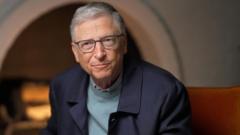Bill Gates has revealed that he has donated over $100 billion through his philanthropic Foundation, dedicated to combatting preventable diseases and alleviating poverty. In an exclusive discussion with the BBC, Gates stated, "I've given over 100 billion, but I still have more to give." This impressive sum is equivalent to the GDP of a small nation or the total cost of infrastructure projects like the HS2 rail line in the UK. Despite his significant charitable activities, Gates emphasizes that he has made no personal lifestyle sacrifices, enjoying luxuries like private jets and sprawling homes.
Gates co-founded Microsoft and, along with Warren Buffett, continues to drive philanthropic efforts through the Gates Foundation, which he originally established with ex-wife Melinda. He acknowledges that the notion of philanthropy was instilled in him from a young age, thanks to his mother's belief that wealth brings with it a responsibility to give back to the wider community. Interestingly, while planning to celebrate the milestones of the Foundation this year, Gates disclosed his giving stats prematurely during the interview.
As Gates prepares to leave the vast majority of his wealth to charity, he has engaged in discussions with his three children about the future inheritance they may receive. Despite his financial legacy, Gates assures that his children will not be left in poverty, even if they inherit only a small fraction of his overall wealth estimated at $160 billion. He cites his mathematical background and the substantial resources he possesses, which allows for generous giving while ensuring his children's financial security.
Reflecting on his childhood in Seattle, Gates shares anecdotes from his upbringing that shaped his character. His memoir, "Source Code: My Beginnings," explores his early life and the competitive spirit instilled in him by family members. While visiting their childhood home, Gates and his sisters reminisce about family traditions and experiences that propelled him forward in life. His obsession with coding began in his teenage years, leading to late-night escapades to access computers secretly.
Gates' memoir reveals his introspection surrounding neurodiversity, suggesting that if he were raised in today’s world, he might have received an autism diagnosis. He recalls moments from his childhood that set him apart, and although he does not plan on a formal diagnosis, he acknowledges the positive impact of his focused learning style on his career.
Throughout the interview, Gates shares his perspectives on contemporary challenges in technology and social media. He expresses concerns about the implications of unrestricted access to social media for children and suggests potential regulations, citing the benefits of age restrictions based on recent legislation in Australia.
As the discussion shifts to political matters, Gates expresses his disappointment at the way major social media platforms manage the line between free speech and accurate information. Notably, he criticizes Robert F. Kennedy Jr. for misleading assertions about vaccines, urging for more responsibility in communicating public health information.
In sum, Gates' story is not one of humble beginnings; instead, he had access to educational resources that few could imagine during his youth, laying the foundation for his future success. Now, as he shares this narrative through his memoir, he emphasizes that the core traits that define us often originate in our formative years. "Much of who you are was there from the start," he concludes as he reflects on his legacy.





















